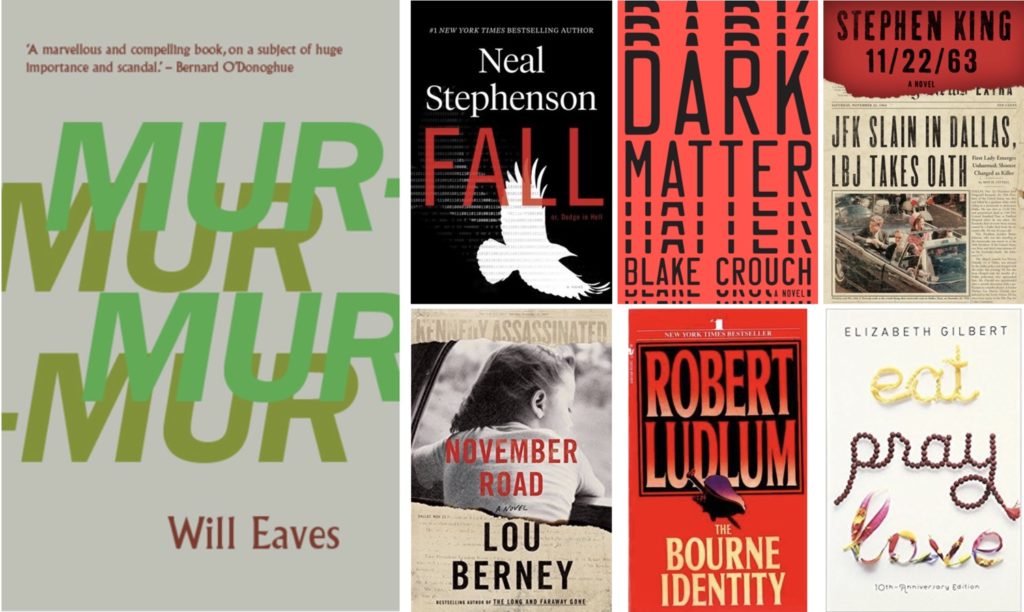Here’s my second entry in Kate’s 6 Degrees of Separation Meme from her blog, Books Are My Favourite and Best. Here’s how it works:
Books can be linked in obvious ways – for example, books by the same authors, from the same era or genre, or books with similar themes or settings. Or, you may choose to link them in more personal or esoteric ways: books you read on the same holiday, books given to you by a particular friend, books that remind you of a particular time in your life, or books you read for an online challenge.
The great thing about this meme is that each participant can make their own rules. A book doesn’t need to be connected to all the other books on the list, only to the ones next to them in the chain. . .
This month we begin with the winner of the 2019 Wellcome Prize, Murmur by Will Eaves.
I have not yet read this book, but I find the description from Amazon fascinating:
In Murmur, a hallucinatory masterwork, Will Eaves invites us into the brilliant mind of Alec Pryor, a character inspired by Alan Turing. Turing, father of artificial intelligence and pioneer of radical new techniques to break the Nazi Enigma cipher during World War II, was later persecuted by the British state for “gross indecency with another male” and forced to undergo chemical castration. Set during the devastating period before Turing’s suicide, Murmur evokes an extraordinary life, the beauty and sorrows of love, and the nature of consciousness.
1. After this description of Murmur, a description of a novel due to hit shelves on June 4 struck me: Fall, or Dodge in Hell by Neal Stephenson, which will also explore the nature of consciousness:
From the author of Snow Crash comes a futuristic take on Paradise Lost. In a parallel universe, Dodge is pronounced brain-dead, catapulting his consciousness into the cloud where the “eternal afterlife” is not the utopia it might first seem.
2. Dark Matter by Blake Crouch also looks at the possibility of parallel universes, although alternative universes might be a more apt phrase, since every choice we make takes us down one path to the exclusion of all other possible paths and their possible worlds.
3. Since different choices could theoretically produce different worlds, one of the classic conundrums of time travel literature is the question of how changing something in the past will affect (or effect; both words are accurate here) the present. In Stephen King’s novel 11/22/63, Jake Epping is tasked by his dying friend with traveling back in time to prevent the assassination of John F. Kennedy. On one of his returns from the past, Jake arrives in a present so frighteningly different from the one he knows that all he can do is scramble back through the time portal as fast as possible to get back to the past and try to fix things.
4. November Road by Lou Berney takes place in late November 1963. Frank Guidry is livin’ the good life as a mid-level functionary of the most powerful crime boss in New Orleans. When President Kennedy is assassinated, Frank remembers that he delivered a get-away car to Dallas just a few days earlier. When a couple of Frank’s associates turn up dead, Frank realizes that whoever’s behind the Kennedy assassination is tying up loose ends—and that he himself is just another loose end. Without even returning home he hits the road to try to outrun the hit man he knows will soon be on his tail.
The obvious connection between November Road and King’s 11/22/63 is the Kennedy assassination. But another similarity between the two is the love story that develops in each and the decision by both male protagonists to sacrifice self-interest and do what’s best in the overall scheme of things.
5. Frank Guidry takes off on a desperate run to save his life. Another character who takes off on an even wilder dash to stay alive is Jason Bourne, the title character of The Bourne Identity, the first—and best—entry in Robert Ludlum’s Jason Bourne series. While scrambling to stay alive, the character known as Jason Bourne searches not only for the people who created his fake persona but also for his true identity. And yes, he’s also working to figure out how to do what’s right within the overall scheme of things.
6. Eat, Pray, Love by Elizabeth Gilbert is the nonfiction story of a woman whose soul-searching takes her to several places around the globe on her quest for self-discovery.
So there we have it: another journey of discovery through the overall scheme of the literary world.
© 2019 by Mary Daniels Brown

